Palm Oil Sector: SIFCA – Ivorian Palm Oil Powerhouse
Founded in 1964, SIFCA is the leading corporate group in West African agribusiness. With a workforce of over 29,000 located in five countries, SIFCA specializes in cultivating, processing, and marketing of three main agricultural products.
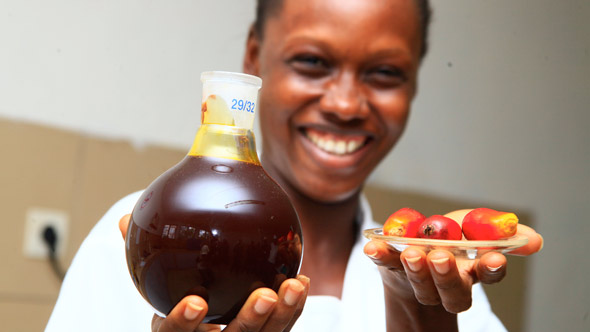
SIFCA
Founded in 1964, SIFCA is the leading corporate group in West African agribusiness. With a workforce of over 29,000 located in five countries, SIFCA specializes in cultivating, processing, and marketing of three main agricultural products. According to Bertrand Vignes, CEO of SIFCA, “SIFCA is divided into 3 divisions: palm oil, rubber, and sugar. Sugar represents 7% of the group’s turnover, while palm oil represents 40% and rubber53%. The plan is to balance the production of palm oil and rubber and to reduce the gap between the two.”
West Africa presently suffers from an annual palm oil deficit of about 15,000 tons.
The SIFCA Group is a conglomerate of four major companies in Cote d’Ivoire specializing in these three commodities/products. Besides its 29,000 employees, SIFCA also works through more than 60,000 farmers, independent plantation owners, outgrowers, and suppliers. The four major subsidiaries for SIFCA‘s activities in Cote d’Ivoire are:
Palm Oil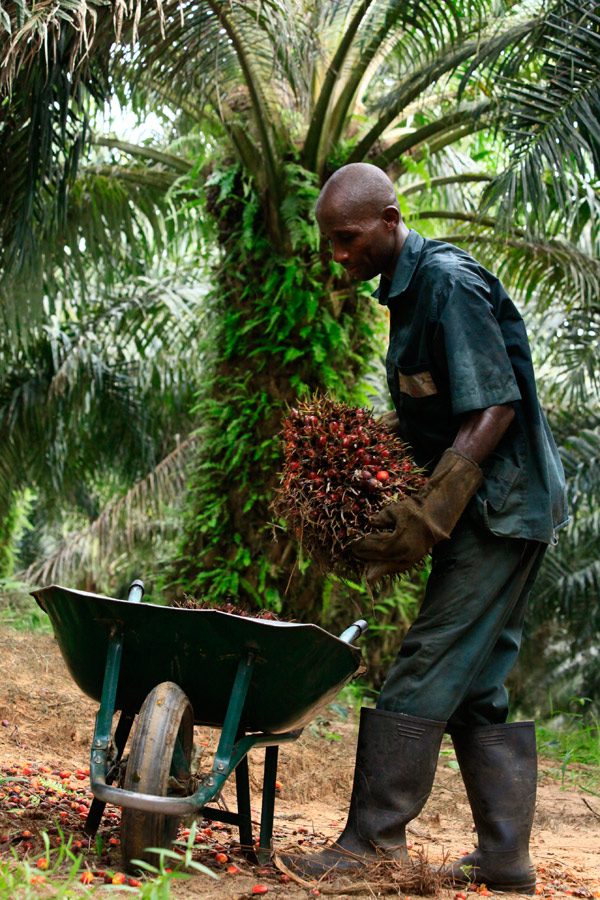
PALMCI is the heir of Palmindustrie, a state-owned company created in 1969 for the growth and nurture of palm plantations and farms. Privatized in 1997, it became PALMCI, which today manages 39,000 hectares of industrial plantations located on eight sites, and supervises approximately 27,000 outgrowers covering an area of 133,000 hectares of village plantations.
PALMCI works closely with AIPH (l’Association Inter-Professionnelle de la Filière Palmier à Huile — the InterProfessional Association of of oil palm sector). PALMCI helps growers by providing seedlings and equipment, credit, and technical advice and planning to new and existing outgrowers. PALMCI also contributes to community development through its support to infrastructures: schools, health centers, roads, etc.
SANIA is a producer of refined palm oil at its modern refinery, the biggest in Africa, producing approximately 280,000 tons of refined palm oil per year. Approximately 180,000 tons of palm oil are consumed in Cote d’Ivoire, while the remaining 100,000 tons are exported. The new SANIA palm oil refining plant in Abidjan was commissioned in June 2010, and has a crude oil production capacity of 1,500 tons/day, and a refining capacity of 1,200 tons/day.
SANIA produces several brands of palm oil and margarine products for consumption under the brands: Dinor, Palme d’Or, Dora, Saint Ave, and Delicia. The market potential for SANIA products is great because of the growing demand within Cote d’Ivoire, as well as an increasing export demand. West Africa presently suffers from an annual palm oil deficit of about 150,000 tons, while the sixteen countries of the Economic Community of West African States (ECOWAS) have unfulfilled needs for 800,000 additional tons.
Rubber
SAPH (Société Africaine de Plantations d’Héveas) specializes in the cultivation of rubber trees, managing 21,500 hectares of industrial plantations, and the processing of natural rubber, located on five sites. SAPH is the first producer of natural rubber in West Africa. Moreover, the company supports outgrowers with relevant actions and tools, to improve their quality of life. Since 2002, SIFCA has had a partnership with MICHELIN which allows it to provide expertise to all of SIFCA’s rubber operations, including SAPH in Cote d’Ivoire. Indeed, SIFCA is also established in Ghana (GREL), Nigeria (RENL) and Liberia (CRC).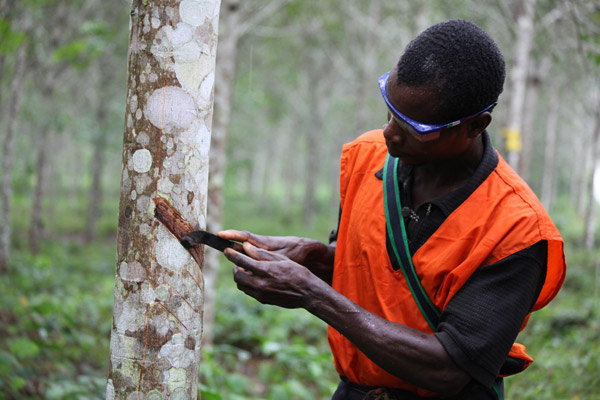
Sugar
SUCRIVOIRE (Ivorian Sugar) is engaged in sugar canes plantations, production and marketing of cane sugar. Following the privatization in 1997 of the formerly state-owned company Sodesucre, SUCRIVOIRE is one of the two main operators of the sugar industry in Cote d’Ivoire. It manages more than 11,000 hectares of Industrial plantations located on two sites.
SIFCA’s Investment and Growth Structure
SIFCA also operates four additional companies in other countries of West Africa where SIFCA does business: CRC and MOPP in Liberia; GREL in Ghana; and RENL in Nigeria. SIFCA also operates a rubber subsidiary in France, SIPH, and has a vessel company, Cosmo Ltd, and a storage company, THSP.
In its present form, Jean-Louis Billon, Chariman of the Board of SIFCA, describes SIFCA as “a medium- or small-sized company,” but insists that “we are working on increasing its position in the world to be a world-class company.”
What he means by world-class company is that:
“when I say that we should be world-class, it means that we should be able to compete not only in the African sub-region, but also with any company in the same products throughout the world.”
While SIFCA is not presently listed on the stock exchange, Mr Billon does not exclude that possibility. “We are also thinking of being listed at some point. We have some companies listed, but SIFCA itself is not listed, so we have to communicate more and show better results and show all our potential. SIFCA is going to be an investment alternative for anyone in the world because we are more concrete and we are dealing with what the world needs.”
Ownership, Partnership, and Sharing Technical Expertise
Four major companies are invested in SIFCA, two of which provide not only capitalization but high levels of partnership and technical expertise. The latter include OLAM and WILMAR, who jointly own NAUVU, a joint-venture which in turn owns 27% of SIFCA. Bertrand Vignes describes the partnering expertise provided by Wilmar and Olam: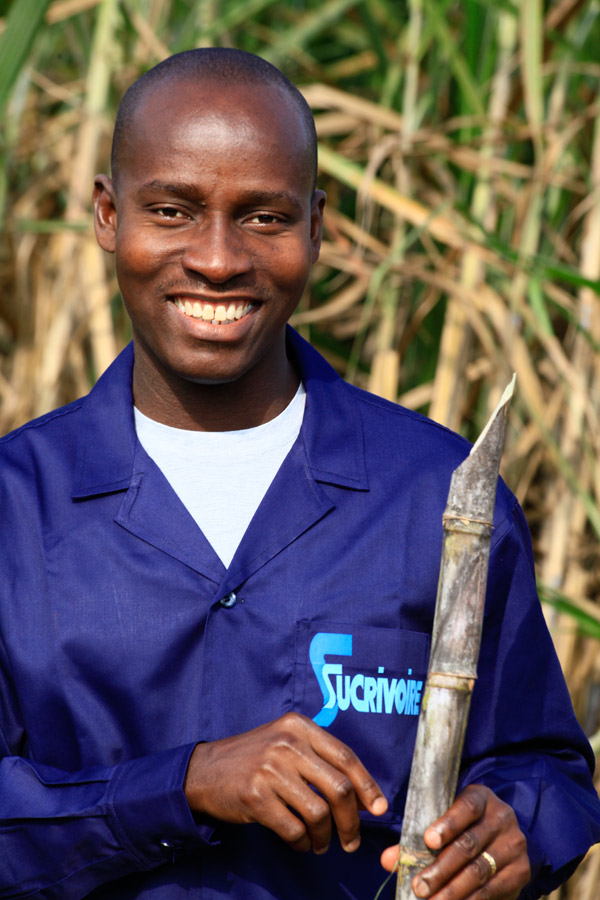
“Wilmar and Olam are our shareholders and partners. Wilmar is a specialist in palm oil production and adds to our partnership a technical support and know-how. Asia has an edge on production and leads the industries best practices. We built a very modern refinery – the biggest in Africa – and Wilmar contributed greatly to that accomplishment. As for Olam, they specialise in trade and have invested in many businesses. They help us sell our products. The relationship is very fruitful and SIFCA feels very privileged to work with them and have their support.”
In addition, Parme Investment owns 44% of SIFCA, and IMMORIV owns 21% of SIFCA. The remaining 8% of SIFCA is owned by private shareholders.
SIFCA’s Strategies for Growth and Expansion
SIFCA sees a major opportunity to grow in the palm oil sector. Because commodity prices are presently high for palm oil, says Mr Vignes, “Currently, there is a business opportunity in the palm oil.” SIFCA’s strategies therefore are:
“As the prices are high SIFCA is investing in the mills in order to reduce the costs. Another cost optimizing strategy is to have better yields. We are replanting the palm oil trees with new varieties of seedlings to improve our results. The best strategy to prepare for a possible downturn is to invest in and to improve productivity when the conditions are favourable and at the same time reduce the costs.”
But SIFCA’s strategy does not only consist of greater investment in its products, but also expansion into nearby countries. According Mr Vignes,
“SIFCA’s strategy is to grow, not only in Côte d’Ivoire, but also in Nigeria, Ghana and Liberia, where we produce rubber. One of our objectives is to produce the palm oil in the above mentioned countries as well. To summarize, while we want to extend the scope of our activities in Côte d’Ivoire at the same time we are planning to grow in the sub-region.”
Billon sees the future of Cote d’Ivoire as an inviting place for investors.
Investment Outlook
Jean-Louis Billon, who is also president of the Chamber of Commerce and Industry of Cote d’Ivoire, is enthusiastic about the future of SIFCA and indeed the entire agricultural sector of Cote d’Ivoire. “Côte d’Ivoire is a country with great potential. We were ahead of everyone between 1960 and 1985—Singapore, South Korea, Morocco, Tunisia—because this country was well-managed, with a clear vision and development process that was sustained for years.”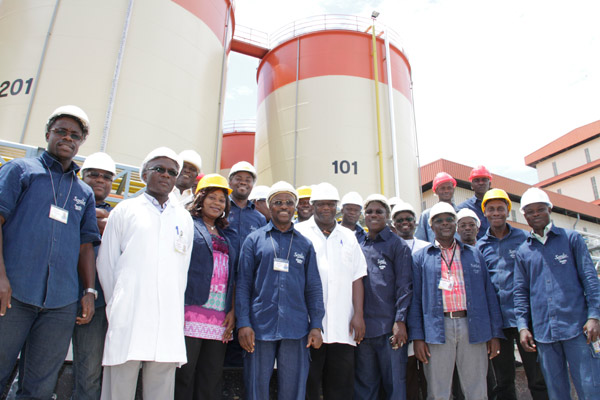
While that “good management” was lost during the years of political instability, since the coming to power of a responsible government last spring, Mr Billon sees the future of Cote d’Ivoire as an inviting place for investors:
“This country could be a strong agricultural power like Brazil. We have the same climate and a lot of land with which we can do exactly the same and feed the entire sub-region. We also have opportunities… like other countries in the sub-region. But I think agriculture, infrastructure, and new technologies are the areas where this country will see the best growth opportunities.
According to Mr Billon, all that is needed is peace and good governance, which he has every reason to expect from the new government. With that in place, the sky is the limit:
“We are in a reconciliation process which I hope will succeed. What we need most of all is peace, stability, and a good political system where differences are accepted. Other than that, I don’t think we need much. This country is a developing one and with stability, we can dream of anything.”